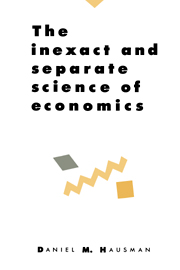Book contents
- Frontmatter
- Contents
- List of figures
- Dedication
- Introduction
- Part I Introduction, structure, and strategy
- 1 Rationality and utility theory
- 2 Demand and consumer choice
- 3 The theory of the firm and general equilibrium
- 4 Equilibrium theory and economic welfare
- 5 Models and theories in economics
- 6 The structure and strategy of economics
- 7 Overlapping generations: a case study
- Part II Theory assessment
- Part III Conclusion
- Appendix: An introduction to philosophy of science
- Bibliography
- Index
2 - Demand and consumer choice
Published online by Cambridge University Press: 04 August 2010
- Frontmatter
- Contents
- List of figures
- Dedication
- Introduction
- Part I Introduction, structure, and strategy
- 1 Rationality and utility theory
- 2 Demand and consumer choice
- 3 The theory of the firm and general equilibrium
- 4 Equilibrium theory and economic welfare
- 5 Models and theories in economics
- 6 The structure and strategy of economics
- 7 Overlapping generations: a case study
- Part II Theory assessment
- Part III Conclusion
- Appendix: An introduction to philosophy of science
- Bibliography
- Index
Summary
Although the theory of rationality developed in the first chapter is central to microeconomics, microeconomics is primarily a positive theory: a theory concerning actual choices and their consequences. In this chapter we will examine the microeconomic theory of consumer choice. Along the way we shall see examples of economic models and, in reflecting on the theory of consumer choice and the explanation of demand, many questions will arise concerning the structure of economic theory and whether the propositions of economic theory are in accord with the evidence. The material here should be familiar to economists, who may want to skip or skim this chapter.
Market demand for consumption goods
One of the central generalizations of economics is the law of demand, which can be oversimplified as: at higher prices, less of any commodity or service will be wanted. When the price of coffee increased, as it did dramatically in response to a Brazilian crop failure in 1975, consumers cut back on their purchases of coffee.
There are several obvious things to note about this generalization. First, it is not a mysterious or deeply theoretical claim. Its truth is obvious to any retailer who holds sales to eliminate excess inventory. Second, it is a generalization about markets, not about individuals. Third, the generalization appears to be inexact and vaguely stated. For example, in 1976, when coffee prices were high, demand for tea increased.
- Type
- Chapter
- Information
- The Inexact and Separate Science of Economics , pp. 28 - 41Publisher: Cambridge University PressPrint publication year: 1992



